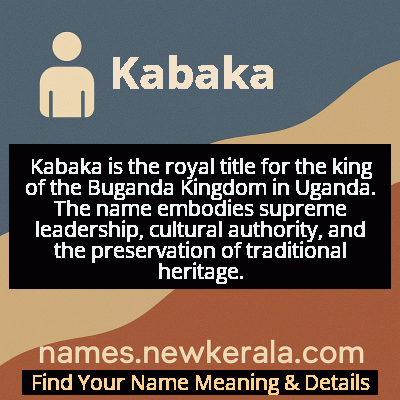Kabaka Name Meaning & Details
Origin, Popularity, Numerology Analysis & Name Meaning of Kabaka
Discover the origin, meaning, and cultural significance of the name KABAKA. Delve into its historical roots and explore the lasting impact it has had on communities and traditions.
Name
Kabaka
Gender
Male
Origin
African
Lucky Number
9
Meaning of the Name - Kabaka
Kabaka is the royal title for the king of the Buganda Kingdom in Uganda. The name embodies supreme leadership, cultural authority, and the preservation of traditional heritage.
Kabaka - Complete Numerology Analysis
Your Numerology Number
Based on Pythagorean Numerology System
Ruling Planet
Mars
Positive Nature
Generous, passionate, energetic, and humanitarian.
Negative Traits
Impulsive, impatient, moody, and can be overly emotional.
Lucky Colours
Red, maroon, scarlet.
Lucky Days
Tuesday.
Lucky Stones
Red coral, garnet.
Harmony Numbers
1, 2, 3, 6.
Best Suited Professions
Military, sports, philanthropy, leadership roles.
What People Like About You
Courage, energy, leadership, generosity.
Famous People Named Kabaka
Kabaka Muteesa I
Monarch
Modernized Buganda Kingdom and established early diplomatic relations
Kabaka Mwanga II
Monarch
Resisted colonial influence and navigated complex religious conflicts
Kabaka Muteesa II
Monarch/Politician
Served as Uganda's first President while maintaining traditional leadership
Kabaka Ronald Muwenda Mutebi II
Monarch
Restored and modernized the Buganda monarchy in contemporary Uganda
Name Variations & International Equivalents
Click on blue names to explore their detailed meanings. Gray names with will be available soon.
Cultural & Historical Significance
The Kabaka's role encompasses being the supreme judge, military commander, and religious leader, with the royal palace (Lubiri) serving as the cultural heart of the kingdom. The elaborate coronation ceremonies, royal rituals, and the complex system of clans (obwakabaka) that support the monarchy demonstrate the deep-rooted cultural infrastructure surrounding the Kabaka. Even during periods of political turmoil, including the abolition of kingdoms from 1967-1993, the cultural reverence for the Kabaka remained strong among the Baganda people, illustrating the title's enduring significance as a symbol of ethnic identity and cultural preservation in a rapidly changing world.
Extended Personality Analysis
Individuals bearing the name Kabaka or associated with the title are typically perceived as possessing strong leadership qualities, natural authority, and deep cultural consciousness. They often exhibit characteristics of wisdom, dignity, and responsibility, reflecting the weight of historical legacy associated with the name. There's an expectation of strategic thinking and diplomatic skill, as the traditional Kabaka had to navigate complex political landscapes while maintaining cultural integrity. The name suggests someone who commands respect naturally and carries themselves with regal composure, often becoming a focal point in their communities or professional circles.
Beyond the obvious leadership attributes, the name implies a deep connection to heritage and tradition, suggesting an individual who values history, ceremony, and cultural continuity. There's often an air of reserved power about them—they may not be the loudest in the room, but their presence is unmistakably felt. The personality traits also include protectiveness toward their community or family, mirroring the Kabaka's traditional role as guardian of the kingdom. This combination of authority, cultural depth, and protective instinct creates a complex personality profile that balances modern leadership demands with traditional values and responsibilities.
Modern Usage & Popularity
In contemporary times, 'Kabaka' is used both as a royal title and occasionally as a given name, though its usage as a personal name remains relatively rare due to its strong association with royalty. The current Kabaka, Ronald Muwenda Mutebi II, has modernized the institution while maintaining its cultural significance, making the title relevant in 21st-century Uganda. Among the Baganda diaspora, the name sometimes appears as a symbolic choice reflecting cultural pride and connection to heritage. The title continues to command immense respect in Ugandan society, with Kabaka's birthday (June 13th) celebrated as a public holiday in Buganda region. While not appearing on popular baby name charts, the name's usage persists in cultural contexts, with some parents choosing it to honor their heritage or express aspirations for leadership qualities in their children.
Symbolic & Spiritual Meanings
Symbolically, Kabaka represents the ultimate embodiment of authority, tradition, and cultural continuity. The name carries connotations of sovereignty, wisdom, and the bridge between ancestral heritage and contemporary society. It symbolizes the living connection to history and the responsibility of stewardship over community and culture. Metaphorically, Kabaka represents the idea of centered leadership—someone who maintains balance between progress and preservation, individual authority and collective welfare. The symbolic meaning extends to concepts of resilience and cultural endurance, as the institution has survived colonialism, political abolition, and modernization while maintaining its core significance. It also symbolizes the idea of sacred kingship, where leadership is not just political but spiritual and cultural, representing the soul of a people and their connection to their land and history.

